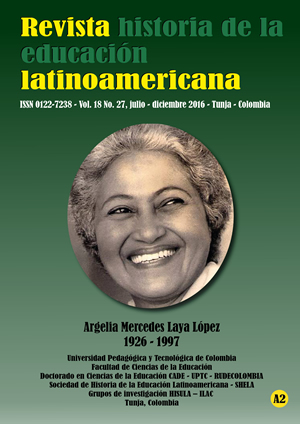Gênero e construção do conhecimento científico

Resumo
O objetivo deste trabalho é fornecer uma introdução aos principais contribuições do feminismo para a construção do conhecimento científico, assistindo como são necessários tanto métodos, como fortes posições epistemológicas, capazes de desconstruir abordagens positivistas para co-construir uma ciência que excede uma androcêntrico causa objectivisms dos falsa de conhecimentos intersubjetivamente contextualizada, inclusiva e consensual, para servir como motor de mudança e transformação das relações de poder patriarcal. A chegada das mulheres para a Universidade levou a uma revolução científica, incorporando o seu novo ponto de vista, capaz de detectar viés misógino que permaneceu fora da história categorização como inferiores. A partir daí foi uma verdadeira rebelião na epistemologia feminista acadêmica –a ponto de vista, o feminismo negro, feministas pós-modernas e empírica contextuales– não tanto para o uso de certos métodos, tais como a força dos seus valores compartilhado democrática e igualitária.
Palavras-chave
Gênero; feminismo; construção de conhecimento científico; mulheres, universitários; rebelião
Biografia do Autor
Ana Guil Bozal
Dra. en Psicología Social, Universidad de Sevilla, España, Grupo de Investigación PAIDI HUM-219 “Género y Sociedad del Conocimiento”, integrante del grupo de investigación HISULA de la Universidad Pedagógica y Tecnológica de Colombia.
Referências
- Arenal, Concepción. La mujer del porvenir. Alicante: Biblioteca Virtual Miguel de Cervantes, 2003.
- Bertomeu, Mª Angustias et al. Mujeres a Ciencia cierta. Material audiovisual CD-ROM interactivo. Sevilla: Instituto Andaluz de la Mujer. 2005.
- Bosch, Esperanza, Ferrer, Victoria A. y Gili, Margarita. Historia de la Misoginia. Unversitat de les Illes Balears: Anthropos, 1999.
- Collins, Patricia Hill. The Social Construction of Black Feminist Thought. Signs vol. 14, No. 4, 1989. DOI: https://doi.org/10.1086/494543
- Collins, Patricia Hill. Learning from the Outsider Within: The Sociological Significance of Black Feminist Thought, Social Problems, vol. 33, No. 6, 1986. DOI: https://doi.org/10.1525/sp.1986.33.6.03a00020
- Collins, Patricia Hill.Comment on Hekman’s “Truth and Method: Feminist Standpoint Theory Revisited”: Where’s the Power?, vol. 22, No. 2, (1997), 375-81. DOI: https://doi.org/10.1086/495162
- Chodorow, Nancy. The Reproduction of Mothering. Berkeley: University of California Press, 1978. DOI: https://doi.org/10.1525/9780520924086
- Dinnerstein, Dorothy. The mermaid and the minotaur: Sexual arrangements and human malaise. New York: Harper and Row, 1976.
- Fox Keller, Evelyn. Reflexiones sobre Género y Ciencia.Valencia: Alfons el Magnànim, 1991.
- Fox Keller, Evelyn. Feminism and Science.Signs7, No. 3, 1982.
- Flores Espínola, Artemisa. Metodología feminista: ¿una transformación de prácticas científicas? Tesis Doctoral. Madrid: Universidad Complutense, 2013.
- Gilligan, Carol. In a DifferentVoice (traduccción: La moral y la teoría: Psicología del desarrollo femenino). México: Fondo de Cultura Económica, 1985.
- González García, Marta I. Género y Conocimiento. En López Cerezo, José Antonio y Sánchez Ron, José M. eds. Ciencia, tecnología, sociedad y cultura en el cambio de siglo. Madrid: Biblioteca Nueva, OEI, 2001.
- Guil, Ana. El papel de los arquetipos en los actuales estereotipos sobre las mujeres. Comunicar Revista de Comunicación y Educación. No. 12: “Estereotipos en los medios, educar para el sentido crítico.1999.
- Guil, Ana. De la mitología al ciberfeminismo: tejedoras de redes. En: Ricardo Pérez-Amat, Sonia Núñez y Antonio García Jiménez. Eds. Comunicación, identidad y género. Madrid: Fragua. Vol. I, 2008.
- Guil, Ana. The Voice of Women Psychologist. En Ana Guil, Ana L. Comunian y Ann O.Roark, ed. Celebrating 70 years of working towards Health, Peace and Social Justice. Sevilla: Arcibeleditores 2015.
- Harding, Sandra. Ciencia y feminismo. Madrid: EdicionesMorata, 1996.
- Harding, Sandra, The instability of the Analytical Categories of Feminist Theory.1986. DOI: https://doi.org/10.1086/494270
- Harding, Sandra. A Socially Relevant Philosophy of Science?Resources from Standpoint Theory’s Controversiality, 19, No.1.Hypatia:2004. DOI: https://doi.org/10.1111/j.1527-2001.2004.tb01267.x
- Harding, Sandra.Whose Science, Who Knowledge?: Thinking from Women’s Live. 1991.
- Hartsock, Nancy C.M.The feminist standpoint: developing the ground for a specifically feminist historical materialism. En Harding, Sandra y Hintikka, Merrill, ed. Discovering reality: Feminist perspectives on Epistemology, Metaphysics, Methodology and Philosophy of Science. Holanda: Reidel Publishing Company. 1983.
- Hartsock, Nancy C M. Money, Sex, and Power: Toward a Feminist Historical Materialism. Northeastern: University Press, 1986.
- Hartsock, Nancy C M. Comment on Hekman's "Truth and Method: Feminist Standpoint Theory. Revisited": Truth or Justice?Signs.Vol. 22, No. 2.1997. DOI: https://doi.org/10.1086/495161
- Hekman, Susan. Truth and Method: Feminist Standpoint Theory Revisited. 1997. DOI: https://doi.org/10.1086/495159
- Hilary Rose, Brain Hand and Heart. A Feminist Epistemology for the Natural Sciences, Signs, vol. 9, no.1.1983. DOI: https://doi.org/10.1086/494025
- Jane, Flax, Thinking fragments: Psychoanalysis, feminism and post-modernism in the contemporary west. Berkeley: University of California Press, 1990. DOI: https://doi.org/10.1525/9780520329409
- Longino, Helen E. Subjects, power, and knowledge: description and prescription philosophies of sciences.En Alcoff, Linda y Potter, Elizabeth.ed. Feminist epistemologies. New York: Routledge. 1993.
- Longino, Helen E. Science as Social Knowledge: Values and Objectivity in Scientific Inquiry. Princeton: Princeton University Press, 1990. DOI: https://doi.org/10.1515/9780691209753
- Longino, Helen E. Gender, Politics and Theorical Virtues. SyntheseVol. 104, No. 3. 1995. DOI: https://doi.org/10.1007/BF01064506
- Longino, Helen E. How Values Can Be Good for Science. En Peter Machamer (ed). Science, values, and Objectivity. Pittsburgh: University Press, 2004).
- Pisan de, Christine. La ciudad de las damas. https://seminariolecturasfeministas.files. wordpress.com/2012/01/la-ciudad-de-las-damas-texto.pdf
- Ruddick, Sara, Maternal Thinking: Toward a Politics of Peace. Boston: Beacon, 1989).
- Smith, Dorothy. Women’s Perspective as a Radical Critique of Sociology», En: Evelyn Fox Keller y Helen Longino: Feminism & Science. Nueva York: Oxford University Press, 1997. original en Sociological Inquiry, 1974, Vol. 44, No.1.
- Smith, Dorothy. The Conceptual Practices of Power: A Feminist Sociology of Knowledge.Boston: Northeastern University Press, 1990.
- Smith, Dorothy. Comment on Hekman's “Truth and Method: Feminist Standpoint Theory Revisited. Signs, Vol. 22, No. 2.1997. DOI: https://doi.org/10.1086/495164
- de%20la%20medicina.htm
